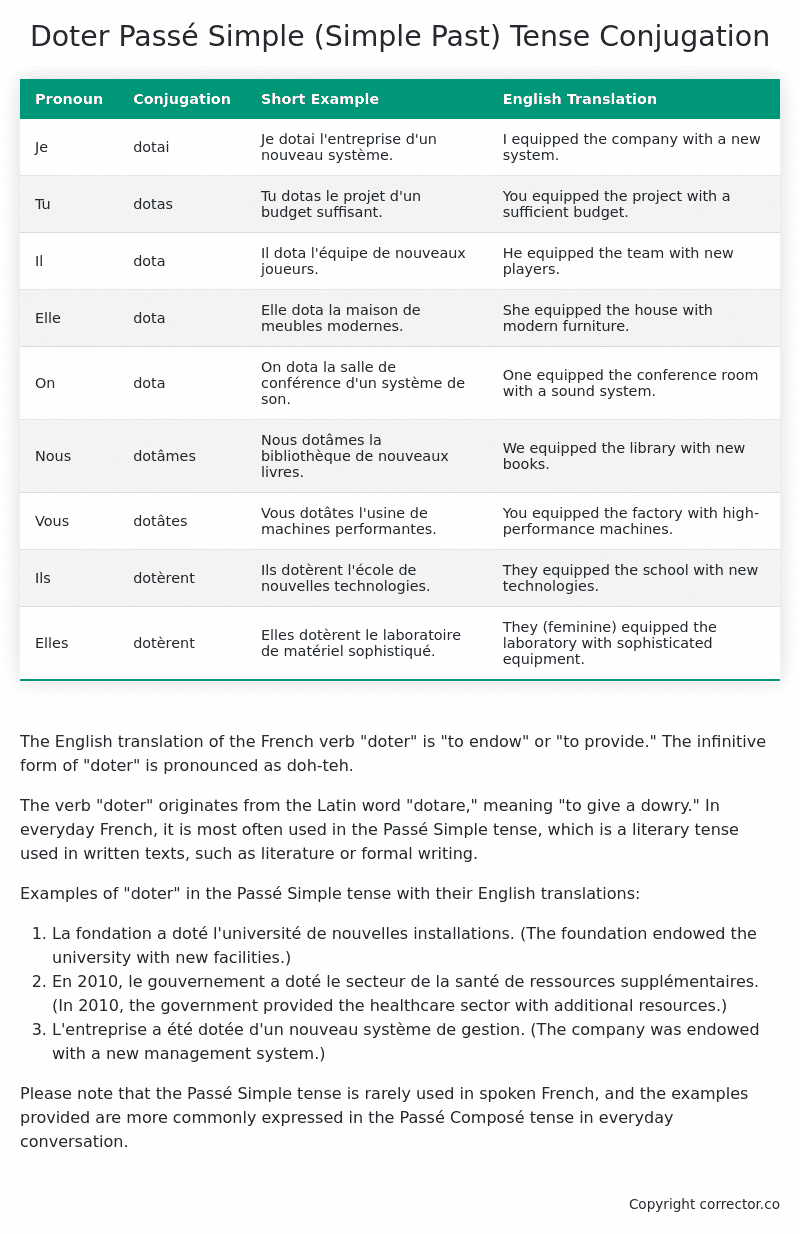Passé Simple (Simple Past) Tense Conjugation of the French Verb doter
Introduction to the verb doter
The English translation of the French verb “doter” is “to endow” or “to provide.” The infinitive form of “doter” is pronounced as doh-teh.
The verb “doter” originates from the Latin word “dotare,” meaning “to give a dowry.” In everyday French, it is most often used in the Passé Simple tense, which is a literary tense used in written texts, such as literature or formal writing.
Examples of “doter” in the Passé Simple tense with their English translations:
- La fondation a doté l’université de nouvelles installations. (The foundation endowed the university with new facilities.)
- En 2010, le gouvernement a doté le secteur de la santé de ressources supplémentaires. (In 2010, the government provided the healthcare sector with additional resources.)
- L’entreprise a été dotée d’un nouveau système de gestion. (The company was endowed with a new management system.)
Please note that the Passé Simple tense is rarely used in spoken French, and the examples provided are more commonly expressed in the Passé Composé tense in everyday conversation.
Table of the Passé Simple (Simple Past) Tense Conjugation of doter
| Pronoun | Conjugation | Short Example | English Translation |
|---|---|---|---|
| Je | dotai | Je dotai l’entreprise d’un nouveau système. | I equipped the company with a new system. |
| Tu | dotas | Tu dotas le projet d’un budget suffisant. | You equipped the project with a sufficient budget. |
| Il | dota | Il dota l’équipe de nouveaux joueurs. | He equipped the team with new players. |
| Elle | dota | Elle dota la maison de meubles modernes. | She equipped the house with modern furniture. |
| On | dota | On dota la salle de conférence d’un système de son. | One equipped the conference room with a sound system. |
| Nous | dotâmes | Nous dotâmes la bibliothèque de nouveaux livres. | We equipped the library with new books. |
| Vous | dotâtes | Vous dotâtes l’usine de machines performantes. | You equipped the factory with high-performance machines. |
| Ils | dotèrent | Ils dotèrent l’école de nouvelles technologies. | They equipped the school with new technologies. |
| Elles | dotèrent | Elles dotèrent le laboratoire de matériel sophistiqué. | They (feminine) equipped the laboratory with sophisticated equipment. |
Other Conjugations for Doter.
Le Present (Present Tense) Conjugation of the French Verb doter
Imparfait (Imperfect) Tense Conjugation of the French Verb doter
Passé Simple (Simple Past) Tense Conjugation of the French Verb doter (You’re reading it right now!)
Passé Composé (Present Perfect) Tense Conjugation of the French Verb doter
Futur Simple (Simple Future) Tense Conjugation of the French Verb doter
Futur Proche (Near Future) Tense Conjugation of the French Verb doter
Plus-que-parfait (Pluperfect) Tense Conjugation of the French Verb doter
Passé Antérieur (Past Anterior) Tense Conjugation of the French Verb doter
Futur Antérieur (Future Anterior) Tense Conjugation of the French Verb doter
Subjonctif Présent (Subjunctive Present) Tense Conjugation of the French Verb doter
Subjonctif Passé (Subjunctive Past) Tense Conjugation of the French Verb doter
Subjonctif Imparfait (Subjunctive Imperfect) Tense Conjugation of the French Verb doter
Subjonctif Plus-que-parfait (Subjunctive Pluperfect) Tense Conjugation of the French Verb doter
Conditionnel Présent (Conditional Present) Tense Conjugation of the French Verb doter
Conditionnel Passé (Conditional Past) Tense Conjugation of the French Verb doter
Conditionnel Passé II (Conditional Past II) Tense Conjugation of the French Verb doter
L’impératif Présent (Imperative Present) Tense Conjugation of the French Verb doter
L’impératif Passé (Imperative Past) Tense Conjugation of the French Verb doter
L’infinitif Présent (Infinitive Present) Tense Conjugation of the French Verb doter
L’infinitif Passé (Infinitive Past) Tense Conjugation of the French Verb doter
Le Participe Présent (Present Participle) Tense Conjugation of the French Verb doter
Le Participe Passé (Past Participle) Tense Conjugation of the French Verb doter
Struggling with French verbs or the language in general? Why not use our free French Grammar Checker – no registration required!
Get a FREE Download Study Sheet of this Conjugation 🔥
Simply right click the image below, click “save image” and get your free reference for the doter Passé Simple tense conjugation!

Doter – About the French Passé Simple (Simple Past) Tense
Formation
Usage
Narration
Historical Context
Interactions with other tenses
Passé Composé
Imparfait
Conditional and Subjunctive
Summary
I hope you enjoyed this article on the verb doter. Still in a learning mood? Check out another TOTALLY random French verb conjugation!


